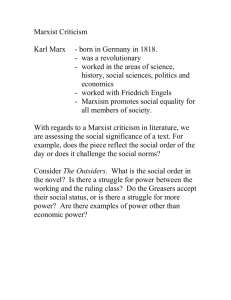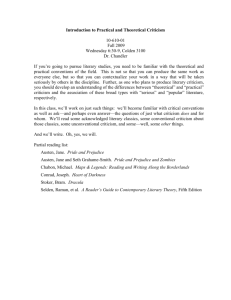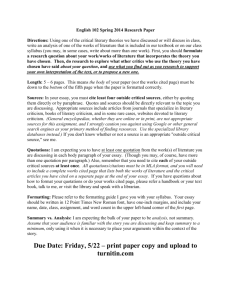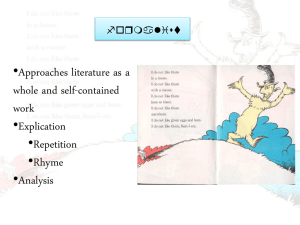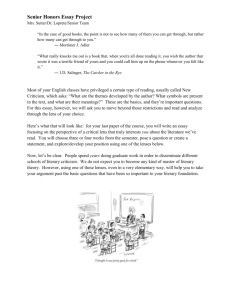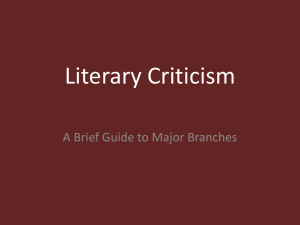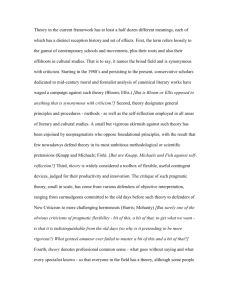Notes on Literary Criticism, ppt
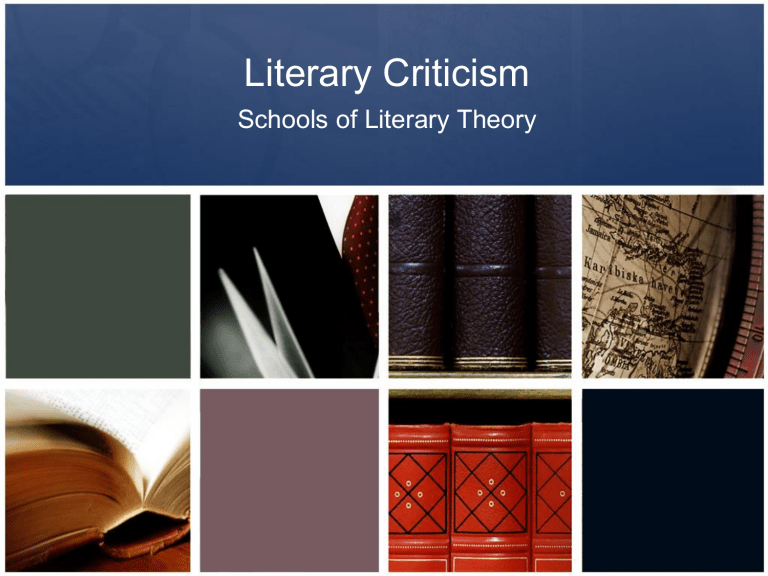
Literary Criticism
Schools of Literary Theory
What is Literary Criticism?
• The study, analysis, and evaluation of a work of literature
• Each school of criticism uses a different focus or angle of analysis
Source: Purdue Owl Writing Lab https://owl.english.purdue.edu/owl/resource/722/01/
What Purpose does it serve?
Viewing literature through these different angles can:
• reveal deep or hidden meaning in a work
• identify the cultural values or beliefs within a novel or play
• relate the work to themes in other literature and the world beyond
The First Critics
• Plato – The Moralist View
– Worthwhile literature must contain a moral or virtuous lesson
• Aristotle – Dramatic Construction
– Effective literature or drama must have a satisfying plot structure, the proper balance of conflict, character development and resolution
• These schools of thought are the basis and beginnings of the discipline of criticism.
Psychoanalytic Criticism
Main Idea: Psychology of the Characters/Author
Builds on the theories of Sigmund Freud:
• Unconscious Desires and Fears and Defense
Mechanisms (repressed memory, denial, regression, fear of intimacy…)
• Id (desire, pleasure), Ego (conscious, rational),
Superego (unconscious, internal morality)
• Oedipus Complex – relationship with the mother leads to competition between child and father
Psychoanalytic Theory Applied to Literature
Critics look for the following in the work as a whole or the characters:
• Repression and Fears from Childhood
• Family Dynamics and Power Struggle
(Oedipal)
• Psychological state of the Author
• Psychological effects and motives of the reader
Marxist Criticism
Main Idea: Class Struggle, Economics
Based on the theories of Karl Marx:
• Oppression of the working class
• How the elite class benefits from that oppression
• Evils of capitalism
• Virtues of Socialism (common ownership of goods and even distribution of wealth)
Marxist Criticism and Literature
Critics ask:
• What social class is represented in a positive light?
• What economic values are reinforced?
• How do the characters from different classes interact? Conflict?
• What social class will benefit if this novel is well-received?
Structuralist and Deconstructionalist
• These two schools of criticism look in great detail at how structural elements creates meaning.
• Structuralist – examines the plot and narrative structure of a work based on traditional or steadfast elements.
• Deconstructionalist – language is a human construct and meaning is created by the reader, not universal
New Historicism
Main Idea: Cultural and Historical Studies
Critics Ask:
• How does the work reflect the culture of the time in which it was written?
• What is the author’s take on the event/time?
• How does the work portray or criticize the political leaders of the time?
• Does the work address marginalized peoples?
Post-Colonial Criticism
Main Idea: Views on Colonialism & its aftermath from both sides of the issue
• How does the text represent colonial issues?
• What does the text reveal about cultural differences between the peoples?
• What problems of the post-colonial era are addressed and what solutions are proposed?
• Does the text reinforce or undermine Western cultural beliefs?
Feminist Criticism
Main Idea: How does the work represent women and their equality to men?
• How are male and female roles defined?
• What are the power relationships between men and women?
• How does the work portray sisterhood and the power of women working together?
• What does the work reveal about the economic and social effects of patriarchy?
African-American Criticism
Main Idea: How does this work depict
African-American characters and culture?
• How are the politics of race portrayed?
• Do the characters reflect Eurocentric or
Afrocentric cultural traits?
• If written by a white author – how does this work reveal the attitudes of white Americans toward black Americans?
• How does the work empower African-Americans?
• How are economic and psychological issues affected by race in this work?
Criticism Assignment
• In your group, read the article you are assigned.
• Highlight/underline the details from the play that this critic focuses on.
• Discuss with your group how this analysis affects your understanding of the play.
• THEN – Mingle with a new group and
EXPLAIN your article to them.
Writing about Criticism
1) Summarize the thesis of the article in a couple of sentences. (“In her article ___ Jane Doe argues…”)
2) Choose one or two key points that you feel ADD to your understanding of the play or introduce an interesting new angle. Explain both WHAT point is made and
HOW it adds to the play.
3) Counterpoint – Either:
- explain one point made in the article that you disagree with or feel is off the mark
- OR – explain an element of the play that this critic ignores that would discredit his/her point
4) Draw a conclusion – Ultimately, how does this critique affect your understanding of the play or characters?
